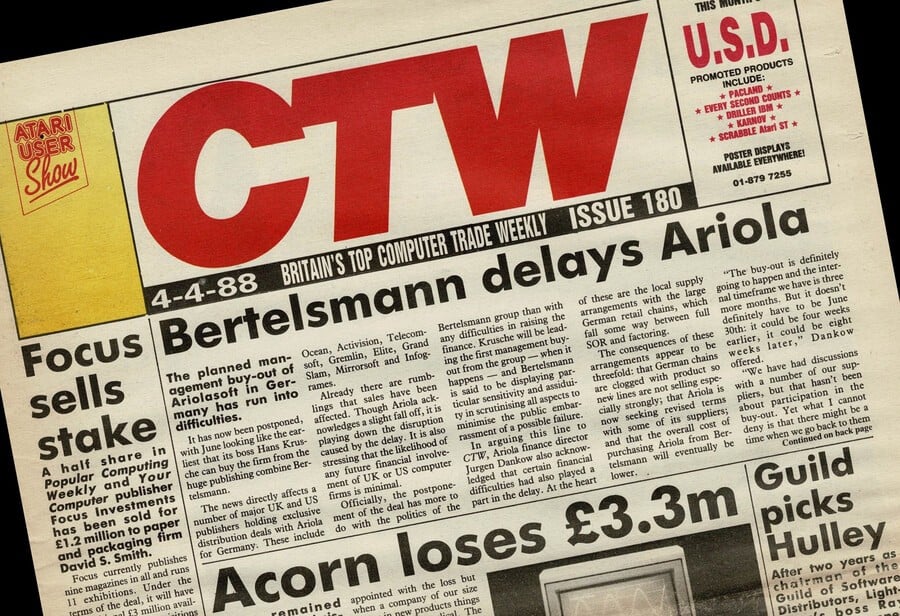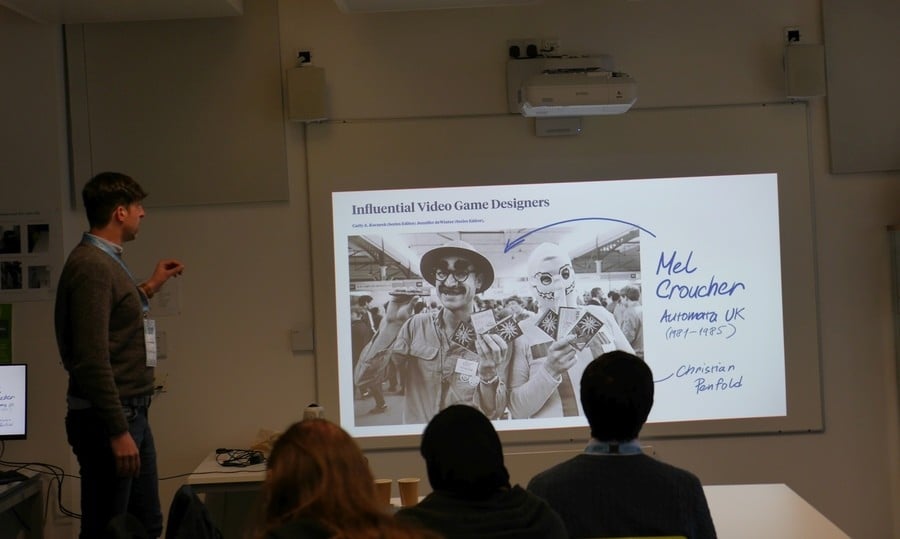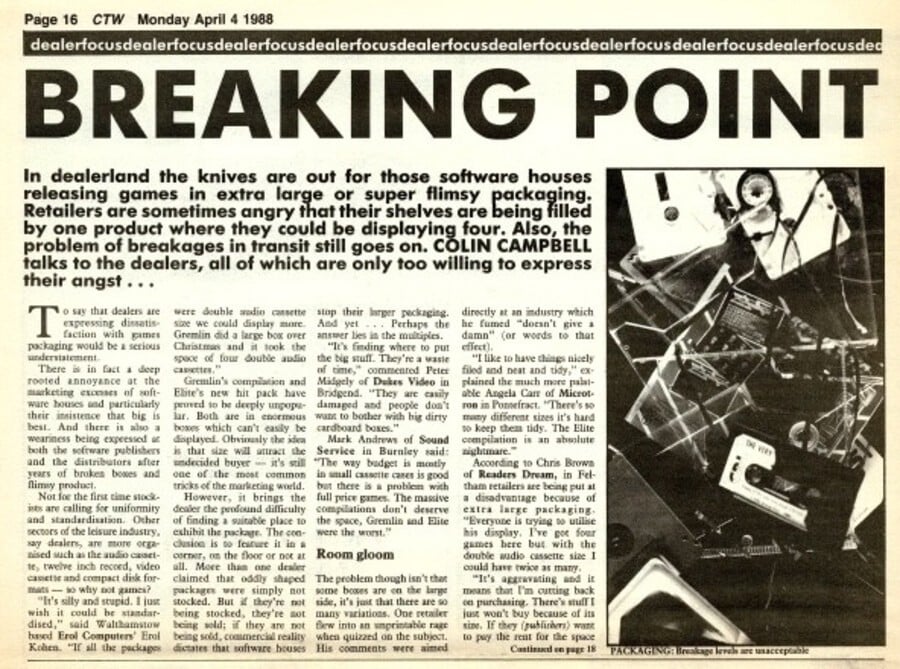
One of the talks at the 2024 Game History conference was about British game developer and journalist Mel Croucher. As Schubert explains, he became Croucher's biographer, interviewing him at his home and having access to his extensive archive of material.
Croucher is probably best known for playing Pimania (1982), Groucho (1983), and Deus Ex Machina (1984) – his final work included audio tapes that were played during games. In later years, Croucher turned to journalism and activism. crash Schwertsch's talk, which featured archival photos and gameplay footage, detailed how Croucher was in many ways an outsider in the British games and press, opposing censorship but arguing for self-regulation and supporting nuclear disarmament.
The 20-minute talk was interesting and a great example of scholarly research, but that is not the point of this satellite article. Schwerf approached me at a conference, believing I had the answers and asking for my help. Do you know where the Computer Trade Weekly archives are?
Naturally, the first assumption would be: The Internet Archive? SegaRetro? At the very least, the National Archives would have one copy of every print publication.
“I've looked again,” Schwerf explains, “The British Library only has the CTW from 1994 onwards. The National Archives doesn't appear to have anything. I'm sending over the existing information on the CTW and the clippings I have. It appears to have been published since 1984. I hope you'll pass on the message that this is an important resource that hasn't been digitised.”

This is a chilling discovery and very surprising. Gaming Alexandria has purchased and scanned countless Japanese magazines, and Sega Retro has 532 issues of the Japanese arcade trade publication. game machinefrom 1974 to 1996. Rare Japanese publications preserved by English-speaking people. Surely the UK trade press is preserved too? Apparently not! The first issue of SegaRetro was issue 180, and several hundred of the 880 issues are missing. Beyond this, there are some cuttings online, and people like Stuart Campbell have submitted their own work. There is no comprehensive archive of scans of every issue.
Discover the earliest issues of Sega Retro. Industry quotes, old advertisements, price and sales chart data, inside news articles and rare photos. A contextual snapshot of the zeitgeist of April 1988. Historical value PricelessWhy haven't these been preserved yet?
Given that it was a trade paper, the recipient must have been someone in the industry. Who would have kept all this for 40 years? Maybe Jeff Minter? He's a veteran British developer who lives in the countryside, so he might have somewhere to store it. Even Croucher only has clippings that relate to his own work.
Dr Charlotte Stevens, lecturer in media and communications at Birmingham City University, told me that if a complete archive were found, they were well equipped to preserve it – they just needed to find it and digitise it while the paper was still legible.
This article is a plea for help. Important sources of information are at risk of being lost. They may already be lost. If you have an older copy, or know someone who has one, please get in touch.
There was much discussion during the conference about the divide between scholars, professional media, preservation societies, and hobbyists and fans. It was emphasized that scholars rely on and leverage the efforts of amateurs, and that their work is valuable. Tasks such as scanning and archiving magazines, dumping and storing game data, and so on, are typically carried out by fan communities in grey areas of copyright.

Dr Poppy Wilde shared her thoughts: “We must remember that at every level there are users and groups we serve. Equally important and validbut different So obviously academics are in a very privileged position of having the time to explore things from the perspective of deep theoretical academic research. As you say, we have fans and historians who look at it from a different perspective.”
This overlap in fields – four pillars of looking at game history – is extremely interesting, especially considering that they rarely seem to directly interact.I ask whether academia would like to see fan communities adopt a more scientific method in their research.
Dr Wilde disagrees: “My view is that I would say no, because what we're actually doing research on is imposing cultural archiving, and the fans themselves are doing really interesting work through their curation, not that it's right or wrong.”
So if you're reading this and are taking the trouble to scan or dump or save, know that your efforts are invaluable. The opportunity to document and preserve the beginnings of the video game industry grows further away with each passing year.
To give an example of how this benefits academia, Richard Sherriff points to another newspaper. Popular Computing Weeklyand FanScan for Clash magazine to examine the correlation between sales charts and Clash Smash Awards. What he found was that, on a cumulative average, the number of Clash Smash Awards each month hadn't changed, but the presence of these games on the charts had significantly decreased.
The investigation is ongoing and there are many theories as to why. Firstly, it's important to know who put the charts together. For the first six months, PCW's Spectrum charts were put together by a small retailer, Buffer Computer Shop. Then it was taken over by WH Smiths, who were able to manipulate the market to some extent. Next came Boots. Then in September 1985 it was put together by Gallup, who Sherriff considers the most reliable in terms of accuracy.
Apart from the credibility of the charts, it is also possible that the large number of Clash Smash awards won and the declining importance of ZX Spectrum and Clash magazine in the market as a whole led to buyer fatigue after a while. At the very least, this suggests that the enthusiast press has become less influential on consumer purchasing as the decade progresses. Further research is needed.
But as we can see, scholars such as Schwertsch and Sherif rely in large part on materials that have been preserved by fans, and Sherif noted in his talk that it was fortunate that they did this.
Help us fill in this glaring gap in British computing history: do you know where you can find the missing issue of Computer Trade Weekly?


